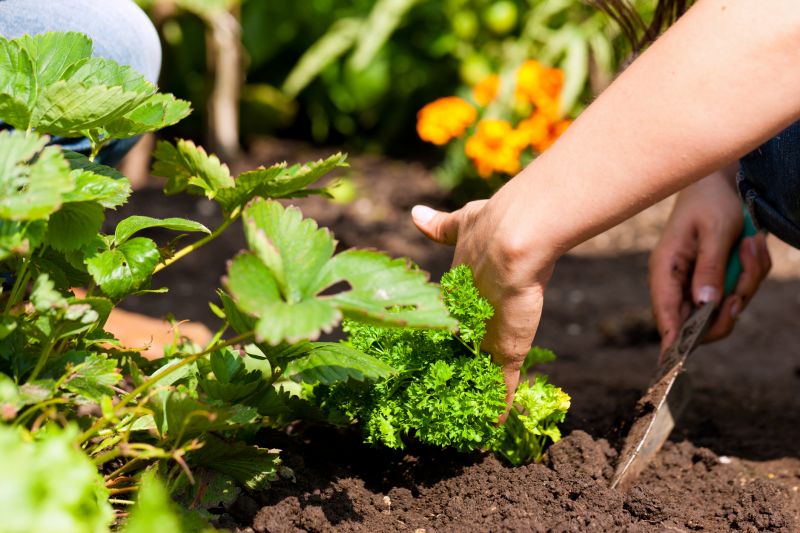Leading Solutions For Garden Soil Preparation To Achieve Rich, Fertile Soil
Discover expert-selected products designed to optimize soil quality and support robust plant development in your garden.
 Preparing garden soil is a fundamental step for establishing a healthy and productive garden. The process involves enhancing soil structure, fertility, and drainage to create an optimal environment for plant growth. Various products are available to assist gardeners in this task, each serving different purposes such as soil amendment, fertilization, aeration, and pH adjustment. Selecting the right combination of products can significantly influence the success of your gardening endeavors.
Preparing garden soil is a fundamental step for establishing a healthy and productive garden. The process involves enhancing soil structure, fertility, and drainage to create an optimal environment for plant growth. Various products are available to assist gardeners in this task, each serving different purposes such as soil amendment, fertilization, aeration, and pH adjustment. Selecting the right combination of products can significantly influence the success of your gardening endeavors.
Top Overall Option
All-in-One Garden Soil Preparation Kit
This comprehensive kit includes a blend of organic compost, soil conditioners, pH adjusters, and nutrient-rich amendments designed to support a variety of gardening needs. It offers a convenient solution for gardeners seeking to improve soil quality holistically, promoting healthy root development and plant growth.
Types of Products For Garden Soil Preparations
Organic Compost
Rich in nutrients and microbial life, organic compost enhances soil fertility and structure.
Soil Amendments
Materials like peat moss, coconut coir, and aged manure improve soil texture and water retention.
Fertilizers
Granular or liquid fertilizers supply essential nutrients to support plant growth.
pH Adjusters
Lime or sulfur products used to modify soil acidity or alkalinity for optimal plant health.
Soil Conditioners
Products like perlite or vermiculite improve aeration and drainage in compacted soils.
Mulch Materials
Organic mulches such as straw or wood chips help conserve moisture and regulate soil temperature.
Granular Lime
Used to raise soil pH and reduce acidity, supporting certain plant varieties.
Sulfur Products
Help lower soil pH for acid-loving plants like blueberries and azaleas.
Humic Acids
Enhance nutrient uptake and improve soil health through organic acids.
Mycorrhizal Fungi
Beneficial fungi that form symbiotic relationships with plant roots to improve nutrient absorption.
Popular Choices
Widely used for enriching garden beds and vegetable plots, offering a natural nutrient source.
Help identify soil deficiencies and pH levels to inform amendment choices.
Suitable for a variety of plants, providing balanced nutrients for healthy growth.
Commonly used to raise soil pH in garden beds needing alkalinity adjustments.
A popular soil amendment that improves moisture retention and aeration.
Lightweight mineral used to improve soil aeration and water retention.
Enhances soil drainage and aeration, especially in container gardening.
A natural source of phosphorus, supporting root development and flowering.
Provides a nitrogen boost to support leafy growth.
Liquid fertilizers rich in trace minerals and growth stimulants.
Promote healthy root systems by fostering beneficial fungi associations.
Materials like straw, bark, or wood chips help retain soil moisture and suppress weeds.
Soil amendments like compost and organic matter are commonly used to improve soil texture and nutrient content. These materials help increase microbial activity and enhance water retention, creating a more hospitable environment for roots. In addition to amendments, fertilizers provide essential nutrients that plants need for healthy development. There are also products designed specifically for pH balancing, ensuring the soil remains within a suitable range for specific plant types.
Proper soil preparation often involves testing the existing soil to identify deficiencies or imbalances. Based on the results, gardeners can choose appropriate products to address specific issues. For example, if the soil is too acidic or alkaline, pH adjusters can be applied. Aeration products like soil conditioners help to loosen compacted soil, promoting better root penetration and drainage. Combining these products thoughtfully can lead to a more fertile and well-structured garden bed.
Investing in quality soil preparation products can make a noticeable difference in garden health and productivity. Whether you are starting a new garden or revitalizing existing beds, understanding the variety of available options enables more informed decisions. Properly prepared soil not only supports plant growth but also reduces the need for ongoing interventions, making gardening more enjoyable and less labor-intensive.
Key Buying Considerations
- Identify your soil type and test for pH and nutrient deficiencies before selecting products.
- Consider the specific needs of your plants, such as acidity or alkalinity requirements.
- Choose organic amendments if you prefer natural soil enrichment methods.
- Evaluate the compatibility of products with existing soil conditions to avoid imbalances.
- Determine whether you need a single product or a combination for comprehensive soil preparation.
- Check the application method and frequency to ensure proper usage and effectiveness.
- Look for products with clear labeling and instructions for best results.
- Assess the quantity needed based on your garden size to avoid over- or under-application.
- Consider the long-term impact of soil amendments on soil structure and health.
- Read reviews and ratings to gauge user experiences and product reliability.
- Select products that support your gardening goals, whether vegetable, flower, or ornamental gardening.
- Be mindful of any potential chemical content if avoiding synthetic additives is a priority.
- Ensure compatibility with existing soil conditioners or fertilizers you plan to use.
- Check for any specific storage or handling requirements to maintain product efficacy.
This page contains affiliate links. We may earn a commission if you make a purchase through these links at no additional cost to you.
